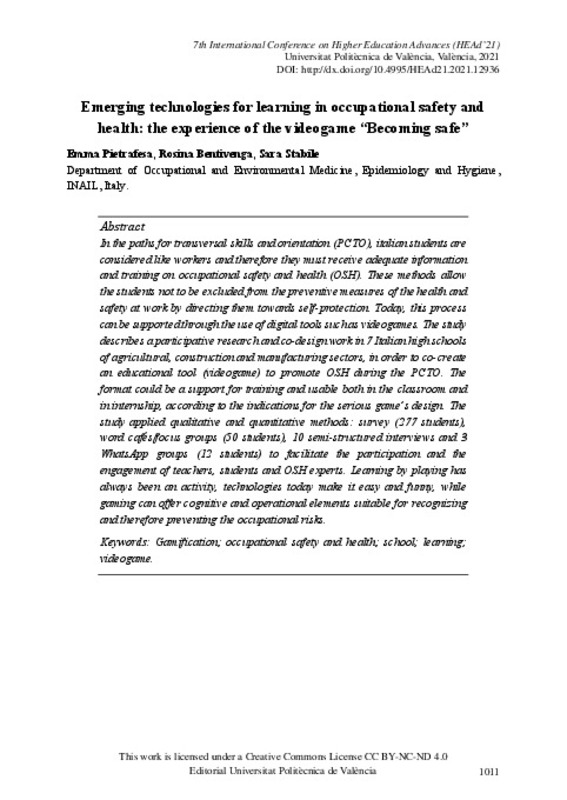JavaScript is disabled for your browser. Some features of this site may not work without it.
Buscar en RiuNet
Listar
Mi cuenta
Estadísticas
Ayuda RiuNet
Admin. UPV
Emerging technologies for learning in occupational safety and health: the experience of the videogame “Becoming safe”
Mostrar el registro sencillo del ítem
Ficheros en el ítem
| dc.contributor.author | Pietrafesa, Emma
|
es_ES |
| dc.contributor.author | Bentivenga, Rosina
|
es_ES |
| dc.contributor.author | Stabile, Sara
|
es_ES |
| dc.date.accessioned | 2021-09-14T07:58:51Z | |
| dc.date.available | 2021-09-14T07:58:51Z | |
| dc.date.issued | 2021-07-26 | |
| dc.identifier.isbn | 9788490489758 | |
| dc.identifier.issn | 2603-5871 | |
| dc.identifier.uri | http://hdl.handle.net/10251/172353 | |
| dc.description.abstract | [EN] In the paths for transversal skills and orientation (PCTO), italian students are considered like workers and therefore they must receive adequate information and training on occupational safety and health (OSH). These methods allow the students not to be excluded from the preventive measures of the health and safety at work by directing them towards self-protection.Today, this process can be supported through the use of digital tools such as videogames. The study describes a participative research and co-design work in 7 Italian high schools of agricultural, construction and manufacturing sectors, in order to co-create an educational tool (videogame) to promote OSH during the PCTO. The format could be a support for training and usable both in the classroom and in internship, according to the indications for the serious game’s design.The study applied qualitative and quantitative methods: survey (277 students), word cafés/focus groups (50 students), 10 semi-structured interviews and 3 WhatsApp groups (12 students) to facilitate the participation and the engagement of teachers, students and OSH experts. Learning by playing has always been an activity, technologies today make it easy and funny, while gaming can offer cognitive and operational elements suitable for recognizing and therefore preventing the occupational risks. | es_ES |
| dc.format.extent | 8 | es_ES |
| dc.language | Inglés | es_ES |
| dc.publisher | Editorial Universitat Politècnica de València | es_ES |
| dc.relation.ispartof | 7th International Conference on Higher Education Advances (HEAd'21) | |
| dc.rights | Reconocimiento - No comercial - Sin obra derivada (by-nc-nd) | es_ES |
| dc.subject | Higher Education | es_ES |
| dc.subject | Learning | es_ES |
| dc.subject | Educational systems | es_ES |
| dc.subject | Teaching | es_ES |
| dc.subject | Gamification | es_ES |
| dc.subject | Occupational safety and health | es_ES |
| dc.subject | School | es_ES |
| dc.subject | VIdeogame | es_ES |
| dc.title | Emerging technologies for learning in occupational safety and health: the experience of the videogame “Becoming safe” | es_ES |
| dc.type | Capítulo de libro | es_ES |
| dc.type | Comunicación en congreso | es_ES |
| dc.identifier.doi | 10.4995/HEAd21.2021.12936 | |
| dc.rights.accessRights | Abierto | es_ES |
| dc.description.bibliographicCitation | Pietrafesa, E.; Bentivenga, R.; Stabile, S. (2021). Emerging technologies for learning in occupational safety and health: the experience of the videogame “Becoming safe”. En 7th International Conference on Higher Education Advances (HEAd'21). Editorial Universitat Politècnica de València. 1011-1018. https://doi.org/10.4995/HEAd21.2021.12936 | es_ES |
| dc.description.accrualMethod | OCS | es_ES |
| dc.relation.conferencename | Seventh International Conference on Higher Education Advances | es_ES |
| dc.relation.conferencedate | Junio 22-23, 2021 | es_ES |
| dc.relation.conferenceplace | València, Spain | es_ES |
| dc.relation.publisherversion | http://ocs.editorial.upv.es/index.php/HEAD/HEAd21/paper/view/12936 | es_ES |
| dc.description.upvformatpinicio | 1011 | es_ES |
| dc.description.upvformatpfin | 1018 | es_ES |
| dc.type.version | info:eu-repo/semantics/publishedVersion | es_ES |
| dc.relation.pasarela | OCS\12936 | es_ES |








